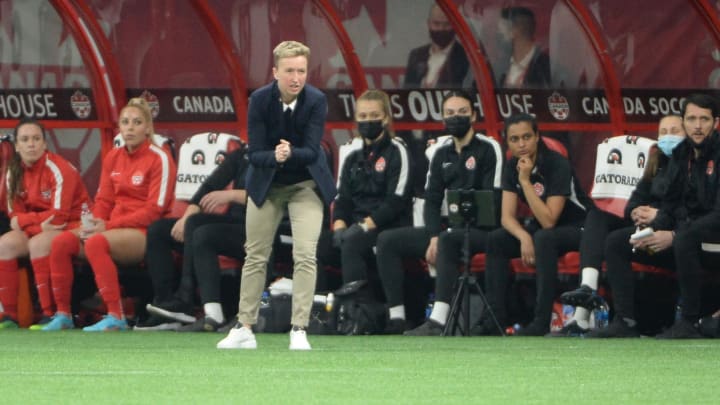All Eyes Are on Canada Soccer at the Olympics As Drone Spying Scandal Develops

PARIS — Canada sent women’s soccer coach Bev Priestman home from the Olympics Friday, though I have to assume that as I type this, she is reading it. An analyst in Priestman’s program was caught using a drone to film an opponent’s practice, which spurred a damning TSN report that Canada’s women’s and men’s teams have been doing this “for years,” which led to Priestman leaving the defending gold medalists, which could lead to her getting fired. The analyst, Joseph Lombardi, and assistant coach Jasmine Mander were also sent home as a result.
Every Olympics has a few scandals. That comes with the territory. The Olympic motto should be Citius Altius Fortius Bribe Us. But as scandals go, this is shaping up to be a big one—bigger than it probably seems to American fans who are accustomed to videotaping scandals.
Last fall, Michigan’s football team was caught taking video of upcoming opponents’ sidelines. It was against the rules, but it happened in packed stadiums; watching the signals was legal, but taking video of them was not. Those transgressions would have been exponentially worse if Michigan had been caught breaking into opponents’ practices and filming them.
That is what Canada did this week—and, according to TSN, before the Tokyo Olympics as well. That is a really significant tactical advantage. Priestman’s team won gold in Tokyo by the thinnest of margins, with a relentlessly disciplined style. Canada allowed just four goals in six games. None of them came on corners or free kicks—set pieces where spying on an opponents’ practice would help the most. Canada beat Brazil in the quarterfinal and Sweden in the final in penalty shootouts.
The IOC has stripped medals from many athletes long after awarding them. Usually, it’s for doping. But in 2008, Swedish wrestler Ara Abrahamian threw his bronze medal to the ground and went after an official, and the IOC took his medal away for violating the spirit of fair play.
If Canada videotaped its opponents’ practices on its way to gold … well …
We’re not there yet. We might not get there. But this is a stain on the Canada Soccer Association, and it’s not going away.
Canada is now battling on two fronts: What happened, and what it meant.
A thorough, transparent investigation would tell us what happened—and there is a reasonable chance we will get one. Canada Soccer’s CEO, Jason Blue, has already acknowledged that: “Over the past 24 hours, additional information has come to our attention regarding previous drone use against opponents, predating the Paris 2024 Olympic Games,” and promised an independent review. Cynicism in these situations is understandable. But Blue has only been on the job for five months. If he did not know Canada was cheating, then the worst thing he can do for his own job security is cover it up.
Whatever that investigation reveals, there will be a lengthy debate about what it meant.
This is where other scandals are instructive. The New England Patriots went against the NFL’s rules on the videotaping of opponents’ sidelines—violations that became particularly brazen after the league sent a memo specifically warning teams not to do it. Within the NFL, a lot of people believed the Pats cheated their way to their first three Super Bowl wins. Those feelings grew stronger as New England failed to win another, and even stronger after the team was allegedly caught deflating footballs. But then New England won three more Super Bowls; an effective rebuttal.
In 2019, the Houston Astros were caught illegally taking video of opponents’ signs. That tainted the team’s 2017 World Series championship. But since that scandal broke, the Astros have played in four straight American League Championship Series and two World Series, and they won the title in '22. That, too, is an effective rebuttal.
After Michigan’s sign-stealing was exposed, the Wolverines went on to win the national championship—another effective rebuttal.
This year’s Canadian women’s team carries an enormous burden to validate the 2021 gold medal. It isn’t fair or completely logical, especially since Canada’s all-time best player, Christine Sinclair, has retired from international play. But public perception is rarely fair.
Priestman is gone. Canada’s women’s soccer team is still here. Suspicion will hang over both, for the rest of these Olympics—and for a long, long time after they end.
